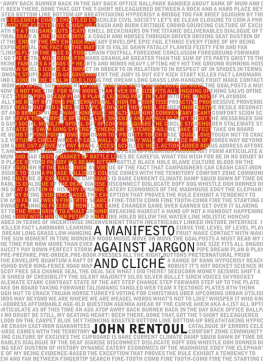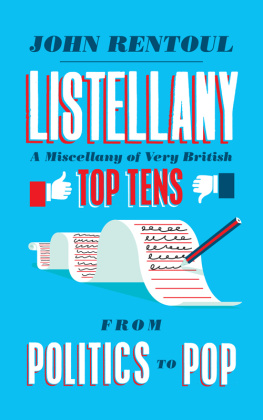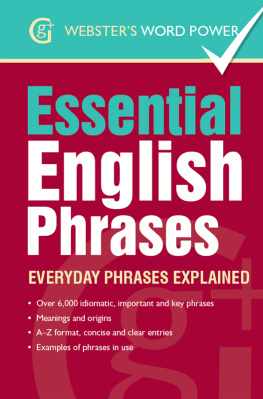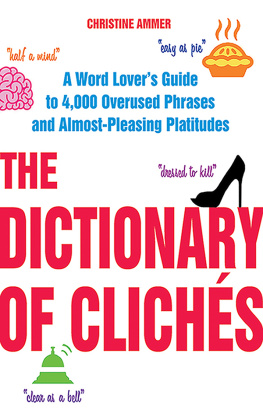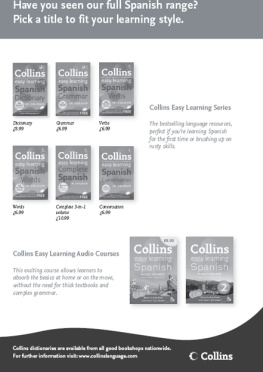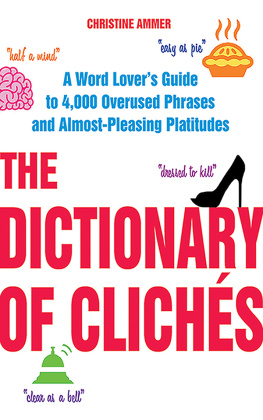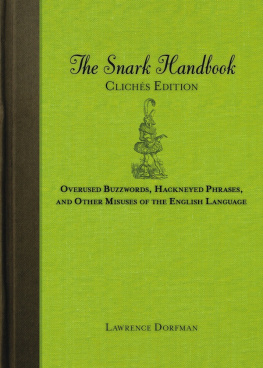I t all started with the television news and a scene familiar in homes everywhere. On 28 June 2008, I heard a political reporter for the BBC say Its the economy, stupid. I dont think I shouted at the television, or threw anything, but you get the idea. No. No more. Never again. Within minutes, with the happy immediacy of the internet, I wrote: The phrase has been added to the list of Prohibited Clichs. By order. I didnt have a list of Prohibited Clichs when I started writing, but, by the time I had finished, there was a list of five. The others were:
A week is a long time in politics.
What part of x dont you understand?
Way beyond or way more.
Any time soon.
Thus began the Banned List, the latest and longest version of which is before you now. It consists of more than clichs of course, because at least a clich was shiny once, before it became dull from over-use, whereas many words and phrases have never been interesting. The list includes: pretentious words that people hope will make them look clever, or at least conceal their uncertainty; jargon intended to advertise membership of a supposedly expert order; and empty, abstract words that fill space while the writer or speaker works out what to say. They all get in the way. So here they are all laid down, never to be used again.
Its the economy, stupid was a particularly provoking phrase, not just because it is a clich but because it is wrong. What James Carville, the wild and brilliant manager of Bill Clintons 1992 presidential election campaign, wrote on the whiteboard in the war room in Little Rock, Arkansas, was The economy, stupid. It was the second of three reminders for campaign workers, the first being Change vs. more of the same and the third Dont forget healthcare. I am sure that photographic evidence exists somewhere , but the words were recorded by Michael Kelly, a contemporary witness, in a report for the New York Times, The 1992 Campaign: The Democrats, on 31 October 1992. (The War Room, a 1993 documentary in which Carville and his colleagues played themselves, also features the correct wording.)
I cannot remember what the BBC report was about, but presumably the reporter was saying that the state of the economy is a factor in politics. This is not always true. The recession did for George Bush Sr in 1992, but not for John Major a few months earlier. The assertion requires evidence and explanation. Instead, all we got was a phrase so memorable that everyone misremembers it. This was television, a stultifying medium, and the reporter had to come to a conclusion in under two and a half minutes.
At least the phrase was pungent once, even though it began to go stale in about 1993. It finally crumbled to dust when it was adopted by the Green Party in 2009 as the title of its manifesto for the European elections, its the economy, stupid, which used the typographical device of putting the whole thing in lower case that had been fashionable in the 1980s.
Some clichs disappear eventually, and this may be one of them. It seems to be on the wane, although it has already lasted nearly two decades. A week is a long time in politics has lasted nearly thirty years longer. It is even less authentic. At least part of its the economy, stupid is genuine. The legend of Harold Wilsons clich is that he said it to lobby journalists around 1964, but no one wrote it down at the time. Nigel Rees, author of Sayings of the Century, asked Wilson in 1977, and he could not recall when or even whether he had said it.
The phrase may owe its durability to it meaning even less than the economy, stupid. All it means is stuff happens. In this it is curiously similar to events, dear boy, events, another unverifiable clich-quotation from the time, attributed to another prime minister called Harold. Alastair Horne, Macmillans biographer, told Robert Harris that he thought his subject might have been referring to the Profumo affair, which was in 1963, but the phrase was not recorded (as attributed) by the Oxford Dictionary of Quotations until 1999.
We do not know who Macmillans dear boy was, or what his question had been, although the gist suggests itself. Yet Wilsons clich is even more persistent, perhaps because it can be varied so easily. If a week is a long time in politics, then a month is an eternity, or an hour is now a long time in politics. The most ingenious recent variation was by Mark Field, the Conservative MP, in an article in 2010. Writing about parliamentary boundaries that would not be decided for another three years, he concluded: And as we know 156 weeks is a long time in politics
Other clichs are intensely but briefly fashionable . What part of x dont you understand? is defunct already. It was popular in the British press around the middle of 2008. Alice Miles, the Times columnist, had just used it to brutally dismissive effect in April, when interest rates were rising and some homeowners complained about market forces as if Margaret Thatcher had never existed: Coming to the end of a fixed-rate deal? Tough. What part of Two-Year Fixed Rate didnt you understand? The economy changed in September interest rates went down after the collapse of Lehman Bros but the phrase itself was already cold ash. I have not seen it in print for years, although a search of an electronic database of national newspapers reveals a notably lame use in March 2011: The coalition promised respect to Scotland. What part of that word dont they understand? But that was in the Scottish edition of The Express, so it hardly counts.
The use of way instead of far is a different kind of clich: that of the over-use in serious writing of a young persons style of speech. When variations of slang are first used they can tickle the pleasure of recognition assuming the slang is well known enough or of simple novelty, but the trick works only once or twice. Usage can change, we all know that, but it is better for the writer not to be the abrasive edge that wears down the readers resistance. One day, way may be accepted as an alternative to far, but let second-rate writers achieve that if the market will bear it.
No such defence can be mounted for any time soon, even if its initial attraction was similar, as a compliment paid by the old or the old country to the young. The adoption by British writers of Americanisms follows the same cycle of freshness, irritation and selective acceptance, but any time soon is not a different way of saying soon, just a longer one.
The Banned List actually started as an email, now lost, that I wrote around 2000 with some rules for leading articles in The Independent. They should never begin with So, I said. Since then I have realised that this is only the first of a rising three-part scale. Worse is to start an article with And so. Worst of all is And so it begins. Time can be saved by not reading on if an article starts with any of those. Although that kind of sweeping judgement can lead one astray, as it once did Martin Amis, to whom I shall come in a moment.
Most of my other rules were more specific to leading articles. (I said we should use formal language such as leading article rather than leader, newspaper rather than paper and avoid contractions such as dont and cant; the other rule that I remember was: We never call for a debate, because we know what we think.) The guidelines also advised against the use of foreign languages, as did George Orwell, to whom I shall also come in a moment, or dead ones, which Orwell did not mention. I think there had been some debate in the office about the use of the Latin word

